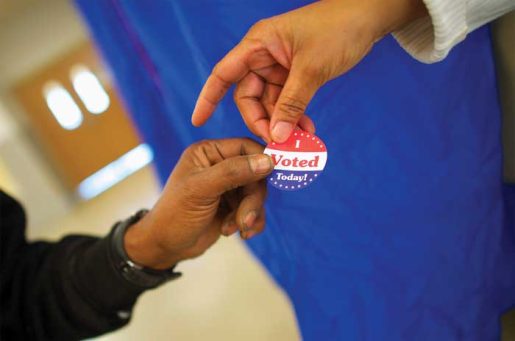U.S. Midterm Elections in November: What the Primaries are Showing
By Hooshyar Afsar
Introduction
The primary elections, by which the two major political parties decide who will be on their ballots come November, are underway. Many major contests—such as those in California, Georgia, and Pennsylvania—are over and there are indications of emerging trends. So far, the only certainty is that we are fast headed toward the key date of Tuesday, November 8, 2022. I intend to look at the results and make arguments for and against voting and whether it makes a difference; yes, there are powerful trends on both left and right that negate the value of voting.

Results So Far
While there is no clear cut trend that has defined the primaries everywhere, there are certain trends that are emerging. Let’s look at them one by one.
Republican Party Results
The most significant outcome so far is the lack of a clear cut trend in favor of candidates supported by Donald Trump. While Trump’s endorsed candidate for Senate in Ohio, J.D. Vance (author of Hillbilly Elegy), won his primary, Trump’s candidate in Pennsylvania, Dr. Oz, won by a much thinner margin and Trump’s preferred gubernatorial candidate in Georgia lost by a wide margin. The Georgia gubernatorial race is significant as Trump made that state and his opposition to sitting Georgia Governor Brian Kemp and Secretary of State Brad Raffensperger a cornerstone of his “stop the steal” campaign—the lie pushed by Trump and his surrogates that the 2020 presidential elections were stolen by Joe Biden. Another key figure in the “stop the steal” campaign—Texas Attorney General Ken Paxton—eventually won, but was also forced into a runoff during that state’s primary. Similarly, Trump’s endorsed candidates lost in the Nebraska and Idaho primary races for governor.
Clearly, Trump still has significant influence in the Republican Party, yet his influence is not unopposed or absolute. This could result in less turnout by die-hard Trump supporters in certain key races in November and, in other cases, Republican voters who oppose Trump may not vote for his candidate or may even stay home. In a sense, a lack of unanimity in the Republican Party is, by itself, a trend. Those margins could make a difference in the final outcome of the midterm elections in November.
Democratic Party Results
The “rise in crime” slogan has taken center stage and the most significant indicator has been in California. In San Francisco, the recall of progressive District Attorney Chesa Boudin, with a more humane approach to criminal justice and sentencing, won 60% of the votes. In Los Angeles, a Republican billionaire, Rick Caruso, led the special mayoral election but did not get enough votes to cross the 50% threshold, so will face Democrat Karen Bass in November. Turnout was low in both these elections, yet they show a clear worry by Democratic voters in California about the rise of crime and homelessness. One interesting fact about crime statistics is that the major increases in 2020 and 2021 are mainly in murder rates; property crimes actually fell in 2020 as compared to 2019. As Pew Research reports, most Americans have a generally negative perception of crime and they think crime was on the rise when it was actually falling. Now, when there is actually a rise in a certain category, like the murder rate, then the perception is even more overblown. The fact is that crime rates dropped significantly between the early 1990s and 2019 and, even with sharp increases of murder rates in the last two years, we are still significantly below 1993 rates. There is no comprehensive study that shows why crime fell significantly in the U.S. the last two decades prior to the pandemic or why murder rates have gone up in 2020 and 2021 (we don’t have updated statistics in 2022). Most credible sources (Pew Research and The New York Times) make assumptions about pandemic stresses. Regardless of the facts, peoples’ perception is their reality and indications are that even Democratic voters have concerns that are so far being expressed at the ballot box.
To all the above I should add that when it comes to the actual makeup of different political leanings, the Democratic Party is much less homogeneous than the Republican Party. Democrats have created a big tent that, while giving them the upper hand in terms of sheer numbers, makes it more difficult to unite all their potential voters regarding a single platform.
So, what is to be done? Should we participate in the process and vote in the primaries and on November 8, or should we stay home because it is of no use? As I said earlier, there are arguments on both sides. Let’s look at them.
Arguments Against Voting
There is definitely a sense among young Americans (many second- and third-generation Iranian Americans fall into this category) that older generations have left them with a generally bad situation (environment, racism, misogyny, and corrupt politicians, among others) and their votes don’t make a difference.
One primary line of reasoning is that the U.S. is not really a representative democracy and it is shifting away from a democracy, so why bother voting? There are many facts supporting this argument that are hard to discount. Among those are the fact that the electoral college, as a vestige of slavery and racism, negates the basic principle of “one person one vote”—since the year 2000, the presidency has twice gone to the person who lost the popular vote. This phenomenon was rare and had only happened once in the 220 years prior to the year 2000, but it is bound to happen more in the future. Other valid arguments are:
The U.S. Senate is a powerful undemocratic parliamentary body in which states with around 30% of the country’s population could hold a majority of the power or dictate the agenda using parliamentary tactics, making decisions that go against national trends like denying a woman’s choice over her body, refusing to implement regulations that would protect the environment, or enacting gun control.
The effects of undemocratic presidential elections and the makeup of the U.S. Senate have long-term repercussions, specifically with the makeup of the U.S. Supreme Court, which has recently made it possible to repeal landmark decisions such as Roe v. Wade to push the U.S. back to the mid-twentieth century and earlier when it comes to a woman’s right over her body.
The redistricting of Congressional and state houses along political, economic, and racial lines (known as “gerrymandering”) have made state houses and the U.S. House of Representatives undemocratic—a minority of voters can easily control their statewide elected officials (e.g., Wisconsin) or the U.S. House of Representatives, resulting in policies that are not aligned with the general trends in the country.
This undemocratic system makes it impossible to bring about significant change in major areas such as racial justice, criminal justice, the environment, health care, gender equality, economic equality, etc.
There is a new rise of voter suppression legislation in many states that will make voting even harder and more restrictive along racial and economic lines.
Other arguments include: power corrupts and Democrats are as bad as Republicans; a few good politicians will not be able to make a difference; we are tired of “holding our nose” and voting for candidates who will preserve the same corrupt system; and last but not the least, American optimism has shown its falsehood domestically and internationally.
To tell you the truth, many of these arguments are solid and have facts and reasoning to support them, convincing many people not to vote. Perhaps that is why the U.S. has one of the lowest voter turnouts among industrialized nations that claim to be democratic.
Now let’s look at the arguments on the other side.
Arguments For Voting
I am going to flip the coin here and argue that the U.S. is not a democracy and that is exactly why we should vote. Participating in the electoral process is an effective way to bring about change, yet that is only one channel among many. We should hold our elected officials accountable and use all the means available to us to sway them in a progressive direction in terms of the policies they support—including voting them out of office if they are not responsive. Yet, while I am not arguing for low expectations, I do support sensible expectations. My argument is that politicians’ power to bring about significant change is limited and, while we should push them to do as much as possible, we should employ the other means of bringing about change at our disposal.
What “other means” am I talking about? Here are a few:
Developing long-term and short-term grassroots movements. Organizing ourselves at all levels and continuing to participate in the political process is perhaps even stronger than the act of voting and relying on our politicians. For this to be successful, each one of us could discover the cause (or causes) that we want to be committed to and upon which we are willing to act.
Finding and linking with communities that are aligned with our causes. Linking with those communities not only makes a difference by keeping us active and bringing about social and political change, it will also bring about more happiness in our personal lives. Believe me, I am speaking from experience. From organizing to stop the repeal of Roe v. Wade to promoting the long-term rights of women over their bodies and their reproductive rights are clear examples that make special sense since the Supreme Court’s pending decision on the matter was leaked.
Connecting our movements with politicians who are willing to participate in and even spearhead those movements. This is a logical way to connect the strength of our movements with voting. One clear example in the last decade is the “Medicare for All” movement. Started by Vermont Senator Bernie Sanders and despite many naysayers who thought and continue to think it will never work, the M4A movement (as it is sometimes referred to) has now gained significant nationwide strength even among many elected officials. Another recent example is what San Francisco DA Boudin said after being voted out of office in his recent recall election, vowing to continue what he called a “movement, not a moment.”
Fighting the nihilistic impulse. All is not lost. Perhaps, all is never lost except for a life-ending event on the planet. I am not for false optimism and I don’t believe in some sort of social fatalism that will eventually bring about progressive change in all facets of life on the planet. Yet, I do believe that concerted action makes a difference. In fact, action is perhaps the only thing that makes a difference at individual, community, societal, and global levels. There is no change with no action. Voting and participating in the electoral process is only one action. Organizing the movements that energize us and linking with our communities of interest is another.
Maintaining a realistic view of U.S. history. There is evidence of positive change in the United States since its inception, yet there are no guarantees that it will persist. There is also evidence that our country often takes major steps back after moving forward. A realistic view helps us learn from the past in terms of what worked and what did not work, take corrective action on what didn’t work, and continue to move forward. Only concerted action will bring about progressive change.
Continuing to vote, despite setbacks in access to voting. Voting restrictions are not the end of voting. The 2022 primaries in Georgia saw a 168% increase in voting compared to the last midterm election in 2018. This means that one of the harshest voting suppression legislations in the country could not stop more people going to the polls. It is not all rosy, yet this is a hopeful indication.
Ending Notes
While the polls, high rates of inflation and a looming economic downturn, political ploys by Republicans on “Critical Race Theory,” fears of increase in crime, voter suppression legislation in many states, and general disappointment by many progressives and younger voters point to a probable winning of Congressional majorities by Republicans, there are other indications, too.
The movement around keeping Roe v. Wade’ alive and stopping a possible national ban on abortion is gaining momentum. Pro-Trump candidates could further energize Democratic voters and cause rifts among Republican voters that would shift close margins. Progressives need to hold candidates accountable and demand change, including demanding a clear-cut promise by Democrats to create a national pro-choice federal legislation if they keep their Congressional majorities.
All is not lost.
Hooshyar Afsar is one of the founders of Racism Awareness Project (RAP), an educational program on the history of and present-day racism in the United States and its impact on the Iranian American community. RAP has had a variety of educational forums across the United States. Mr. Afsar has written several articles and book reviews on the topic for Peyk and other publications. He can be reached at hoosh.afsar@rapusa.org.


















